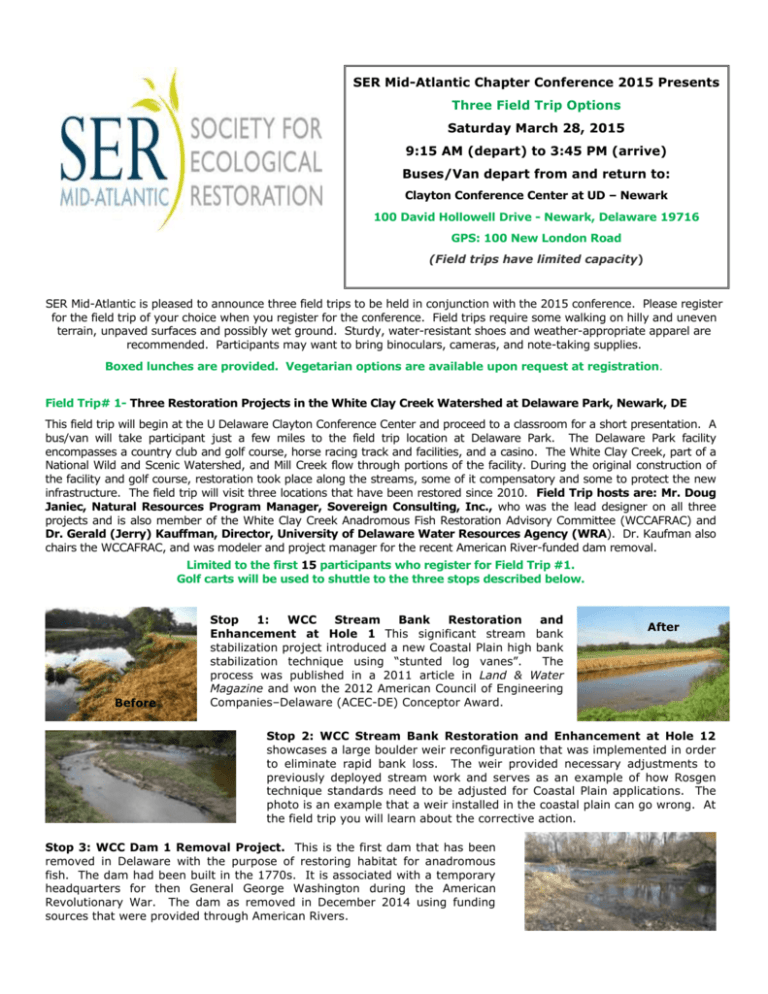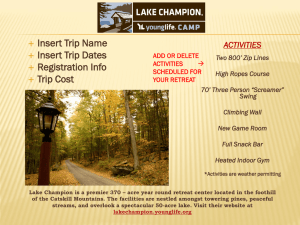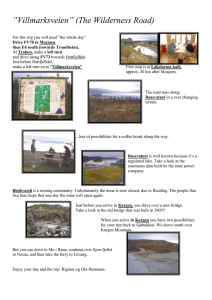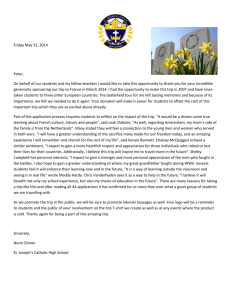Final-Draft-Short-Summaries-Field-Trips_2015_-Revised-1
advertisement

SER Mid-Atlantic Chapter Conference 2015 Presents Three Field Trip Options Saturday March 28, 2015 9:15 AM (depart) to 3:45 PM (arrive) Buses/Van depart from and return to: Clayton Conference Center at UD – Newark 100 David Hollowell Drive - Newark, Delaware 19716 GPS: 100 New London Road (Field trips have limited capacity) SER Mid-Atlantic is pleased to announce three field trips to be held in conjunction with the 2015 conference. Please register for the field trip of your choice when you register for the conference. Field trips require some walking on hilly and uneven terrain, unpaved surfaces and possibly wet ground. Sturdy, water-resistant shoes and weather-appropriate apparel are recommended. Participants may want to bring binoculars, cameras, and note-taking supplies. Boxed lunches are provided. Vegetarian options are available upon request at registration. Field Trip# 1- Three Restoration Projects in the White Clay Creek Watershed at Delaware Park, Newark, DE This field trip will begin at the U Delaware Clayton Conference Center and proceed to a classroom for a short presentation. A bus/van will take participant just a few miles to the field trip location at Delaware Park. The Delaware Park facility encompasses a country club and golf course, horse racing track and facilities, and a casino. The White Clay Creek, part of a National Wild and Scenic Watershed, and Mill Creek flow through portions of the facility. During the original construction of the facility and golf course, restoration took place along the streams, some of it compensatory and some to protect the new infrastructure. The field trip will visit three locations that have been restored since 2010. Field Trip hosts are: Mr. Doug Janiec, Natural Resources Program Manager, Sovereign Consulting, Inc., who was the lead designer on all three projects and is also member of the White Clay Creek Anadromous Fish Restoration Advisory Committee (WCCAFRAC) and Dr. Gerald (Jerry) Kauffman, Director, University of Delaware Water Resources Agency (WRA). Dr. Kaufman also chairs the WCCAFRAC, and was modeler and project manager for the recent American River-funded dam removal. Limited to the first 15 participants who register for Field Trip #1. Golf carts will be used to shuttle to the three stops described below. Before Stop 1: WCC Stream Bank Restoration and Enhancement at Hole 1 This significant stream bank stabilization project introduced a new Coastal Plain high bank stabilization technique using “stunted log vanes”. The process was published in a 2011 article in Land & Water Magazine and won the 2012 American Council of Engineering Companies–Delaware (ACEC-DE) Conceptor Award. After Stop 2: WCC Stream Bank Restoration and Enhancement at Hole 12 showcases a large boulder weir reconfiguration that was implemented in order to eliminate rapid bank loss. The weir provided necessary adjustments to previously deployed stream work and serves as an example of how Rosgen technique standards need to be adjusted for Coastal Plain applications. The photo is an example that a weir installed in the coastal plain can go wrong. At the field trip you will learn about the corrective action. Stop 3: WCC Dam 1 Removal Project. This is the first dam that has been removed in Delaware with the purpose of restoring habitat for anadromous fish. The dam had been built in the 1770s. It is associated with a temporary headquarters for then General George Washington during the American Revolutionary War. The dam as removed in December 2014 using funding sources that were provided through American Rivers. Field Trip # 2 – Restorations at Red Clay and Brandywine Areas of Delaware’s Piedmont Matt Sarver, of Sarver Ecological, LLC, who serves on Boards for SER Mid-Atlantic, the Mid-Atlantic Invasive Plant Council, and the Delmarva Ornithological Society, has put together a field trip that will weave through the Red Clay and Brandywine Piedmont Region of Northern Delaware. Due to the Van Capacity, Field Trip #2 is limited to the first 30 participants who register. Stop # 1 Mt Cuba Center is a renowned botanical garden with a focus on native plants and ecosystems. In addition to 50 acres of display gardens, Mt. Cuba Center's Natural Lands consist of nearly 550 acres of steeply rolling hills, stream valleys, rock outcrops, and deciduous forests. 35 state-rare flora species and 3 state-rare fauna species are found here. Host Nathan Shampine, Natural Lands Manager, Mount Cuba Center, will discuss data-driven restoration and land management, native plants, and invasive species management. Stop # 2 Coverdale Farm Preserve consists of 352-acres scenic rolling hillsides, fields, floodplain meadows, mature woodlands, a pond, and the beautiful stream valley. It is recognized for abundant birdlife, butterflies, and wildflowers, and a 196-acre preserve that includes the Burrows Run valley. Managed by the Delaware Nature Society, it has permanent protection as part of the state System of Nature Preserves and is maintained as a model for biodiversity management; the valley is the location of various ecological surveys and offers a venue for scientific research. Hosts Jim White, Associate Director of Land Management at Delaware Nature Society, and Rick McCorkle, Wildlife Biologist, Delaware Bay Estuary Project, US Fish and Wildlife Service, will showcase recent projects including native meadow creation and improvement, riparian woodland and wetland restoration, and management for species of special concern. Stop # 3 Flint Woods Preserve is a 170-acre, private estate situated in in the Piedmont region of Delaware. The property’s unique topography and rock outcroppings did not lend itself to farming, thus preserving what are now some of the state’s oldest forests. Lying beneath the trees in this forest is a wide variety of spring ephemerals, seventeen species of ferns, several seeps and streams that provide habitat to a wide array of rare herps, and an understory that provides cover to nesting songbirds that comprise part of the 171 species of birds that have been observed on the property. Outside of the forests are 70 acres of meadows, 35 of which were recently established from no-till grain fields. Hosts Jared Judy and Mike Weaver, Flintwoods Preserve Land Managers, will present restoration recent projects and adaptive management strategies, such as deer management, prescribed fire, and invasive species control. Field Trip# 3- A Day at Stroud Research Center and Tour of Stroud’s Freshwater Habitat Restoration Sites Field Trip #3 is limited to the first 30 participants who register. For this Field Trip only, participants may drive independently to Stroud Center at 970 Spencer Road, Avondale, PA. For those driving to the Stroud Center (and not taking the bus), please notify Yousuf Nejati (yousufnejati@gmail.com) before the morning of the field trip. From conceptual design projects at the center… Stroud™ Water Research Center has made the study of freshwater systems their primary study since 1967. The Center is dedicated to understanding the ecology of streams, rivers, and their watersheds — both pristine and polluted. The mission of Stroud’s Watershed Restoration Group is to develop and implement watershed restoration programs that connect landowners, stakeholders, and the general public with best management practices for conserving, restoring, and protecting watersheds; and help provide the infrastructure on the ground for sustaining sources of clean fresh water at a local, regional, and global scale. The Watershed Restoration Group works closely with the Center’s scientists and educators to interpret and use research findings and the findings of other scientists to develop and implement its projects. Hosts from Stroud’s Watershed Restoration Group and field trip stops will be updated soon. …to applied watershed restoration in the field.






